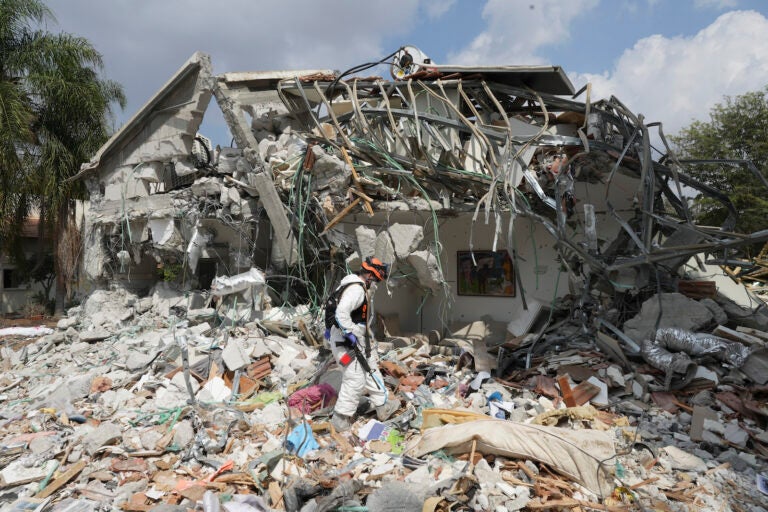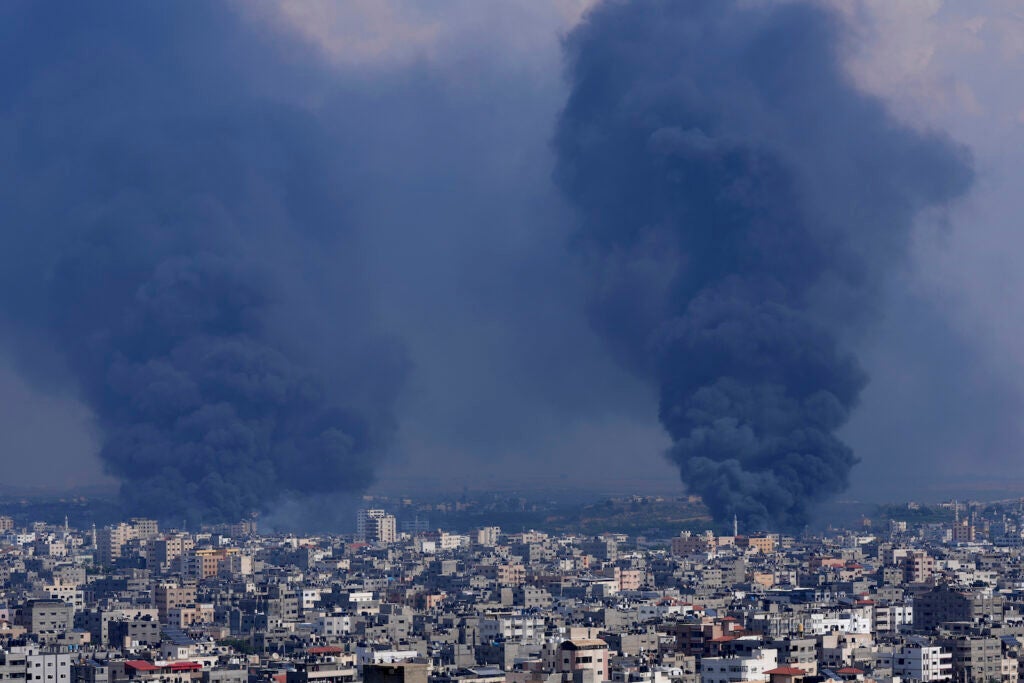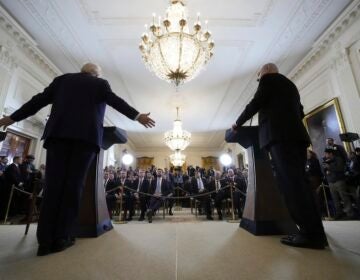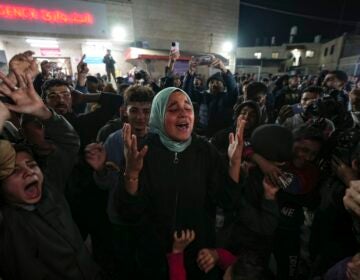What to know on the sixth day of the war between Israel and Hamas
Palestinians say civilians are paying the price in strikes on Gaza, a small coastal strip of land packed with 2.3 million residents.

An Israeli soldier walks by a house destroyed by Hamas militants in Kibbutz Be'eri on Wednesday, Oct. 11, 2023. (AP Photo/Baz Ratner)
The Israeli military is preparing for a possible ground operation in Gaza but the political leadership has not yet decided on one, Lt. Col. Richard Hecht told reporters Thursday as the latest Israel-Palestinian war rolled into a sixth day of fighting since Hamas launched its attack Saturday.
Hamas said it’s seeking to end Palestinians’ suffering, which had become intolerable under unending Israeli military occupation and increasing settlements in the West Bank and a 16-year-long blockade in Gaza.
People in Gaza spent the Wednesday night in darkness, surrounded by the ruins of pulverized neighborhoods as Israeli Prime Minister Benjamin Netanyahu vowed to “crush and destroy” Hamas, with the support of a new war cabinet that includes a longtime opposition critic.
The latest conflict, which has claimed at least 2,500 lives on both sides, is expected to escalate.
Here are some key takeaways from the war:
What is the situation in Gaza?
As the Israeli military retaliates for the Hamas attack, Palestinians say civilians are paying the price in strikes on Gaza, a small coastal strip of land packed with 2.3 million residents.
Near-constant air strikes that level entire neighborhoods have forced some 340,000 people to flee their homes, according to the U.N., most crowding into U.N. schools. Others sought the shrinking number of safe neighborhoods. Gaza is only 40 kilometers (25 miles) long, wedged among Israel, Egypt and the Mediterranean Sea.
The Hamas-run Interior Ministry said Israeli strikes demolished two multistory houses without warning, killing and wounding “a large number” of people, mainly civilians.
While Israel has insisted that it is giving advance notice of its strikes, it is employing a new tactic of leveling whole swaths of neighborhoods, rather than just individual buildings.
The U.N. said that the Israel siege has also resulted in dire water shortages for over 650,000 people. Israel has cut off supplies of food, fuel, electricity and medicine into Gaza, plunging many Palestinians into pitch blackness after the only power station ran out of fuel and shut down. Hospitals’ supplies of medicine and fuel for emergency generators are also expected to run out within days.
At least 1,354 people have been killed in Gaza, according to authorities there. Israel says hundreds of the dead inside Gaza are Hamas members.

Will Israel launch a ground assault?
The Israeli military says it is preparing for a possible ground operation in Gaza but that political leadership has not yet decided on one. Lt. Col. Richard Hecht told reporters Thursday that forces “are preparing for a ground maneuver if decided.”
Israel’s government is under intense pressure from the public to topple Hamas, which has ruled Gaza since 2007. Israel has called up some 360,000 army reservists and has threatened an unprecedented response to Hamas’ bloody, wide-ranging incursion over the weekend.
The Israeli military said more than 1,200 people, including 189 soldiers, have been killed in Israel — a staggering toll unseen since the 1973 war with Egypt and Syria that lasted weeks.
The Israeli military said it is currently targeting Hamas’ senior military and political leaders, whom it blames for the weekend attack.
Four previous rounds of Israel-Hamas fighting between 2008 and 2021 all ended inconclusively, with Hamas battered but still in control. Removing it from power would likely require reoccupying Gaza, at least temporarily. Even then, Hamas has a long history of operating as an underground insurgency in areas controlled by Israel.
A ground offensive would also likely result in a surge of casualties on both sides.
The risk of the war spreading beyond Gaza was evident Wednesday, when the Iranian-backed Lebanese militant group Hezbollah fired anti-tank missiles at an Israeli military position and claimed to have killed and wounded troops. The Israeli military confirmed the attack but did not comment on possible casualties. The Israeli army shelled the area in southern Lebanon where the attack was launched.
What has been the response from the U.S. and other nations?
U.S. President Joe Biden on Wednesday called the attack by Hamas the worst attack on Jews since the Holocaust as the number of U.S. citizens killed in the fighting ticked up to at least 25 on Thursday.
“This attack was a campaign of pure cruelty — not just hate, but pure cruelty — against the Jewish people,” Biden told Jewish leaders gathered at the White House.
Signs of U.S. support for Israel were seen across the administration, with Secretary of State Antony Blinken arriving in Tel Aviv on Thursday for meetings.
British Foreign Secretary James Cleverly arrived in Israel on Wednesday to express “unwavering solidarity” with the country following the attacks by Hamas, while Britain’s King Charles III condemned the “barbaric acts of terrorism in Israel,” a palace official said Wednesday. The German government held a minute of silence Wednesday in parliament for the Israeli victims of the Hamas attacks.
Malaysian Foreign Minister Zambry Abdul Kadir slammed Israel’s “outrageous acts of cruelty” in cutting off food, water and fuel to the Gaza Strip and said Malaysia will provide an emergency fund to help Palestinians.
Turkey is holding negotiations for the release of civilian hostages held by Hamas, a Turkish official said Wednesday.
Egypt has engaged with intensive talks with Israel and the United States to allow the delivery of aid and fuel through its Rafah crossing point. However, it pushed back against proposals to establish escape corridors out of Gaza, saying an an exodus of Palestinians from the enclave would have grave consequences on the Palestinian cause.
What is the status of foreign citizens in Israel?
Dozens of citizens of other countries were killed or abducted in Saturday’s attack, who were in Israel for reasons ranging from raves to agricultural work.
The number of U.S. citizens confirmed to have been killed in the latest Israel-Hamas war has risen to at least 25, Blinken said Thursday during a visit in Tel Aviv with Netanyahu. That’s an increase from 22 the day before. The State Department has said at least 17 more Americans remain unaccounted for.
The Chinese government said Thursday that three of its citizens were confirmed dead, and two others were missing. The Chinese Embassy in Israel had reported earlier this week that a young woman of Israeli and Chinese heritage was among the scores of hostages taken by Hamas fighters.
Two Brazilian citizens were killed as the result of the Hamas attack on Israel, according to that country’s foreign ministry, which also said that three people with dual Brazilian-Israeli citizenship were missing after they disappeared at a music festival outside of Kibbutz Re’im.
The Austrian government has confirmed that one of three Austrian-Israeli citizens who went missing after Hamas’ attack on Israel has been found dead.
Spain’s Foreign Ministry said one of two Spaniards affected by the Hamas attacks in Israel had died.
What prompted Hamas’ attack on Israel?
Hamas, which seeks Israel’s destruction, says it is defending Palestinians’ right to freedom and self-determination.
But the devastation following Hamas’ surprise attack on Saturday has sharpened questions about its strategy and objectives. Hamas officials have said they planned for all possibilities, including a punishing Israeli escalation.
Desperation has grown among Palestinians, many of whom see nothing to lose under unending Israeli control and increasing settlements in the West Bank, the blockade in Gaza and what they see as the world’s apathy.
In addition to citing long-simmering tensions, Hamas officials cite a long-running dispute over the sensitive Al-Aqsa Mosque that is sacred to both Muslims and Jews. Competing claims over the site, known to Jews as the Temple Mount, have spilled into violence before, including a bloody 11-day war between Israel and Hamas in 2021.
Tensions between Israel and the Palestinians escalated with recent violent Palestinian protests. In negotiations with Qatar, Egypt and the United Nations, Hamas has pushed for Israeli concessions that could loosen the blockade on the Gaza Strip and help halt a worsening financial crisis.
___
AP writer Sam Magdy contributed to this report from Cairo.
WHYY is your source for fact-based, in-depth journalism and information. As a nonprofit organization, we rely on financial support from readers like you. Please give today.





